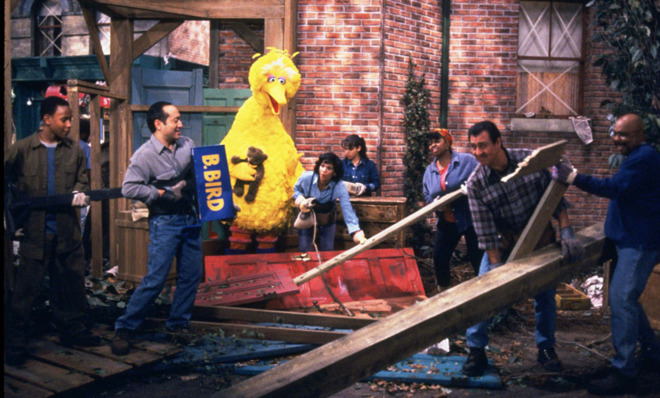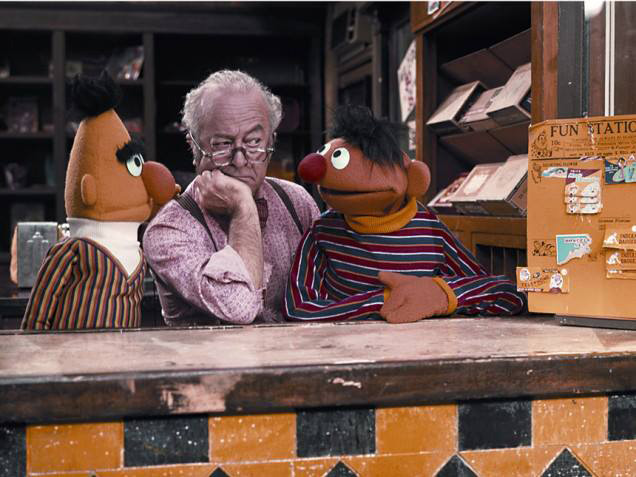When kids abandon the lessons of Sesame Street
And parents learn lessons from their kids

A free daily email with the biggest news stories of the day – and the best features from TheWeek.com
You are now subscribed
Your newsletter sign-up was successful
My son graduated from middle school last week, and my daughter graduated from high school. That's a lot of commencement.
As I sat there in those gymnasiums, tears dripping down my face, watching my children moving on, parents cheering from the bleachers, cameras flashing, the band Pomp and Circumstancing, my own formative years flashed before me, and I dream-sequenced back to the moment when my mother sat me down and said, "There's a new show on that I want you to watch. It's very educational."
That was in 1969. I was three, and it was love at first muppet. Sesame Street was all about cooperation, collaboration, creativity, neighborly kindness, loving the underdog, wondering about rainbows… I watched it religiously.
The Week
Escape your echo chamber. Get the facts behind the news, plus analysis from multiple perspectives.

Sign up for The Week's Free Newsletters
From our morning news briefing to a weekly Good News Newsletter, get the best of The Week delivered directly to your inbox.
From our morning news briefing to a weekly Good News Newsletter, get the best of The Week delivered directly to your inbox.
You can imagine my shock, then, when I left my muppet bubble and entered the real world of school. I'd be sitting on the playground with a fuzzy caterpillar curling around my finger, and suddenly balls were being hucked at me by kids I'd played with my whole life. Heck, kids I'd watched Sesame Street with. And the teachers didn't do anything. They seemed to think it was normal. Funny even. I realized that I was supposed to drop the caterpillar and catch the balls. And throw them back. So I did. And that meant I was in a game. And we all know what happens with games. Someone wins. And someone loses. I don't remember what happened to the caterpillar.
Before I knew it, everything was like that. There were contests and races and prizes, winners and gold stars, losers and less thans. Even birthday parties were like that, with that miserable pin-the-tail-on-the-donkey, and you pinned the tail on the refrigerator, and everybody laughed at you. Or musical chairs, where just when you started to enjoy the music, you had some big-boned kid hip-check you off the dance floor.
Was I the only one to notice that life after pre-school just wasn't Sesame Street?

What happened to everyone, my nice little k-is-for-kindness inner-child wondered? Why weren't the Marias and Luises and Mr. Hoopers and Bobs sorting all this mayhem out? It was like we'd been hijacked by a bunch of crazed grown-ups, blowing whistles in our faces, telling us to run and throw and kick and WIN!
A free daily email with the biggest news stories of the day – and the best features from TheWeek.com
Grammar school: Same thing, only now we had field hockey sticks and harder balls and big scary girls with mouth guards that grunted as they shot those balls into our shins. And you were supposed to go up against them, equally a-huck, a-grunt. Toward a goal! With a freckled guerilla warrior in it, holding her hands in Tasmanian Devil fists.
Worst of all were the mothers — the mothers who drove carpool, who made Christmas cookies with us, screaming from the side lines: "Get her! Go! Fight! WIN!" Perfectly nice, casserole-wielding mommies, suddenly devolving into gladiators. Witch hunters. They might as well have been screaming, "Stone them!" And the daddies! They went to the football games and just screamed, "Kill!"
I had questions. But at that age, I didn't dare ask. It seemed like I might get in big trouble if I did.
It was E.V.E.R.Y.W.H.E.R.E. Us vs. Them. In classrooms, in spelling bees — heck, even in choir. Everything ranked and awarded and polarized. I missed Sesame Street, where everyone was recognized for their difference and ability to co-create.
I felt duped. And so I gravitated toward the arts. Where nobody yelled. I could co-create, at least with myself. I did everything I could to stay off those playing fields and out of competitive academia. I got good grades, and kept my questions for my journal where I felt safe.
Don't get me wrong. I craved school spirit and community togetherness. But how could we go out there and make the world a better place with all that separateness. Competition seemed counter-productive to the messages we were given from the beginning. How could the headmaster orate the phrases Make the world a better place, and Fight to win, _____ (fill in school mascot) in one sentence?
I wish we could erase the word "versus" from our vocabulary. I hate to think that to feel whole, we have to take something from someone, like their best shot or their dignity or their place at Stanford. Why do we set our kids up for all this? Why don't we teach our kids that to fight isn't to win, and no, it's not how you play the game either. Why does there have to be a game in the first place? Games pit one person against the other. All of them — even ping-pong, or backgammon, or Farkle. (And I love me the Farkle!) Sure, games can be fun — playing, and being good at it, and winning. But what would our world be if we dropped competition altogether and collaborated? Why can't we be in creation mode with our community, like Big Bird preached?
This central question dogged the last 18 years of motherhood as I watched my kids be bored out of their minds at theater camp, dread music lessons, and ogle the soccer and baseball fields as I drove them to Ecology Club field trips. Finally I caved. They wanted to play games. Plain and simple. And a large part of motherhood is facilitating your children's dreams, whether you like it or not. Still I worried — would they find peace inside themselves if they were constantly competing in our society's games — from school all the way to corporate America, social jockeying, and beyond? Would they learn to walk the status quo and not feel free to shout their unique voices into the vast field of life for fear of meeting the Tasmanian goal-tenders of the world?
But as I sat there this week and watched all those graduates, so electric with possibility, most of them who have been competing in one way or another for years, I felt something that surprised me.
My kids are incredible people. Society — whatever shape it's in, is lucky to have them! They are respected by their community and peers, and, yes, coaches. They belong. And they didn't do it by standing in line. They've asked good questions. They've considered the answers, and they've done what they've loved with all their might, including collaboration. They're comfortable in their own skin, and I'm proud of them. I didn't raise them to be little me's. I raised them to be thems. Are they any better or any worse for having participated in all those competitions? I'm not sure it matters. They're happy. As a mother, that's what I want for them.
So to all those graduates out there, as you choose where to conform and where to rebel, where to carve your own paths, and when to stand in line… I hope you know that you have choices. We've created institutions that some of us fit into, and some of us don't. And that's okay. My only bit of advice, since you didn't ask, is that when you are looking for whatever is your passion, may you look inside yourself for it first. Because the biggest competition of your life will probably be with yourself. And in yourself, you will find your most powerful enemy and hopefully your most powerful community. In that case, I cheer you on, and I hope you win.
Laura Munson is the best-selling author of This Is Not The Story You Think It Is and founder of Haven Retreats.